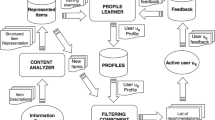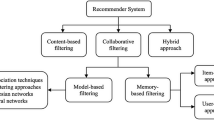Abstract
The fast evolution of e-learning systems offers learners with huge opportunities for accessing learning activities via online. This largely provides support and improvement to the learning practices of the users. Nonetheless the problems corresponding to e-learning systems limit its application success. This is due to the fact that several learning activities like different learning materials, subjects, and learning resources, which are developing in this online world makes an e-learning system hard. It is difficult for the individual learners to choose optimized activities for their specific situations/requirements/query, since there exists no personalized service that belongs to that specific user. Recommender systems, which target a trendering personalized environment for studying materials can be utilized for resolving those issues in e-learning system. The available system proposed an e-learning personalization depending on the strategy of hybrid recommendation in cloud-based platform. It presented a recommendation system named as Protus that can do the automatic adjustment to the levels of preferences and expertise of the learners. It identifies various patterns of learning style and behaviours of the learners’ by means of testing the learning styles of the learners and then having their server logs. Nonetheless it does not accomplish optimal clustering and also does not take the trust value of user into consideration for improving the accuracy. In order to resolve this problem, the new system proposed a trust based hybrid recommendation (TBHR) strategy. Here, in this system, the learning style and the habits of the learners’ are evaluated so as to test the learning styles of the learners and then their server logs are mined. Then the noises are eliminated employing re-rating mechanisms. Depending on the various learning styles, the leaners are clustered by making use of hybrid firefly and K-means algorithms. Afterwards, the behavior and the preferences of the learners are analyzed by carrying out the mining of the sequences observed frequently by the AprioriAll algorithm. Trust-based weighted mean is utilized for analyzing the trust value of users. At last, this system finishes the customized recommendation of the learning content based on the ratings corresponding to these sequences observed frequently, rendered with the help of the Protus system. The system proposed attains a better performance in comparison with the available system in terms of mean absolute error (MAE) metric, accuracy and speed.







Similar content being viewed by others
References
Shishehchi, S., Banihashem, S.Y., Zin, NAM.: A proposed semantic recommendation system for e-learning: a rule and ontology based e-learning recommendation system. In: Information Technology (ITSim), 2010 International Symposium in vol. 1. IEEE (2010)
Adomavicius, G., Tuzhilin, A.: Toward the next generation of recommender systems: a survey of the state-of-the-art and possible extensions. IEEE Trans. Knowl. Data Eng. 17(6), 734–749 (2005)
Parvez, S.M., Blank, G.D.: Individualizing tutoring with learning style based feedback. Intelligent Tutoring Systems 9th International Conference, Montreal, 23–27 June, pp. 291–301. Springer, New York (2008)
Riahi, G.: E-learning systems based on cloud computing: a review. Procedia Comput. Sci. 62, 352–359 (2015)
Pocatilu, P., Alecu, F., Vetrici, M.: Using cloud computing for e-learning systems. In: Proceedings of the 8th WSEAS international conference on Data networks, communications, computers, pp. 54–59 (2009)
Dong, B., Zheng, Q., Yang, J., Li, H., Qiao, M.: An e-learning ecosystem based on cloud computing infrastructure. In: Ninth IEEE International Conference on Advanced Learning Technologies, pp. 125–127. IEEE (2009)
Soonthornphisaj, N., Rojsattarat, E., Yim-ngam, S.: Smart e-learning using recommender system. In: International Conference on Intelligent Computing, pp. 518–523 (2006)
Ge, L., Kong, W., Luo, J.: Courseware recommendation in E-learning system. In: International Conference on Web-based Learning (ICWL’06), pp. 10–24 (2006)
Nagori, R., Aghila, G.: LDA based integrated document recommendation model for e-learning systems. In: 2011 International Conference on Emerging Trends in Networks and Computer Communications (ETNCC), pp. 230-233. IEEE (2011)
Liu, F. J., Shih, B. J.: Learning activity-based e-learning material recommendation system. In: Ninth IEEE International Symposium on Multimedia Workshops, 2007 (ISMW’07), pp. 343–348 (2007, December)
Lu, J.: Personalized e-learning material recommender system. In: International conference on information technology for application, pp. 374–379 (2004)
Kusumawardani, S.S., Prakoso, R.S., Santosa, P.I.: Using ontology for providing content recommendation based on learning styles inside e-learning. In: International Conference on Artificial Intelligence, Modelling and Simulation (AIMS), pp. 276–281 (2014)
Yau, J., Joy, M.: Architecture of a context-aware and adaptive learning schedule for learning Java. In: Seventh IEEE International Conference on Advanced Learning Technologies 2007(ICALT 2007), pp. 252–256 (2007)
Krithika, L.B., Lakshmi Priya, G.G.: Student emotion recognition system (SERS) for e-learning improvement based on learner concentration metric. Procedia Comput. Sci. 85, 767–776 (2016)
Lee, S.H., Choi, J., Park, J.I.: Interactive e-learning system using pattern recognition and augmented reality. IEEE Trans. Consum. Electron. 55(2), 2009 (2009)
Takano, K., Li, K. F.: An adaptive e-learning recommender based on user’s web-browsing behavior. In: International Conference on P2P, Parallel, Grid, Cloud and Internet Computing (3PGCIC), pp. 123–131 (2010)
Gallego, D., Barra, E., Aguirre, S., Huecas, G.: A model for generating proactive context-aware recommendations in e-learning systems. Front. Educ. Conf. 2012, 1–6 (2012)
Kusumawardani, S.S., Prakoso, R.S., Santosa, P.I.: Using ontology for providing content recommendation based on learning styles inside E-learning. In: 2nd International Conference on Artificial Intelligence, Modelling and Simulation (AIMS), pp. 276–281 (2014)
Gasparini, I., Lichtnow, D., Pimenta, M.S., de Oliveira, J.P.M.: Quality ontology for recommendation in an adaptive educational system. In: International Conference on Intelligent Networking and Collaborative Systems, 2009 (INCOS’09), pp. 329–334 (2009)
Chen, W., Niu, Z., Zhao, X., Li, Y.: A hybrid recommendation algorithm adapted in e-learning environments. World Wide Web 17(2), 271–284 (2014)
Lucas, J.P., Luz, N., Moreno, M.N., Anacleto, R., Figueiredo, A.A., Martins, C.: A hybrid recommendation approach for a tourism system. Expert Syst. Appl. 40(9), 3532–3550 (2013)
Salehi, M., Kamalabadi, I. N.: Hybrid recommendation approach for learning material based on sequential pattern of the accessed material and the learner’s preference tree. Knowledge-Based Systems, vol. 48, pp. 57–69 (2013)
Wang, J., Wang, H., Zhou, Y., McDonald, N.: Multiple kernel multivariate performance learning using cutting plane algorithm. In: 2015 IEEE international conference on Systems, man, and cybernetics (SMC), pp. 1870–1875. IEEE (2015, October)
Zhang, Y.: Incorporating phrase-level sentiment analysis on textual reviews for personalized recommendation. In: Proceedings of the eighth ACM international conference on web search and data mining, pp. 435–440. ACM (2015, February)
Schedl, M., Schnitzer, D.: Hybrid retrieval approaches to geospatial music recommendation. In: Proceedings of the 36th international ACM SIGIR Conference on Research and Development in Information Retrieval, pp. 793–796. ACM (2013, July)
Herlocker, J., Konstan, J., Tervin, L.G., Riedl, J.: Evaluating collaborative filtering recommender systems. ACM Trans. Inf. Syst. 22(1), 5–53 (2004)
Xiaojun, L.: An improved clustering-based collaborative filtering recommendation algorithm. Clust. Comput. 1–8 (2017)
Yuan, L.W., Su, L., Zhang, Y., Fang, G., Shu, P.: Cloud-based learning system for answer ranking. Clust. Comput. 1–14 (2017)
Author information
Authors and Affiliations
Corresponding author
Rights and permissions
About this article
Cite this article
Bhaskaran, S., Santhi, B. An efficient personalized trust based hybrid recommendation (TBHR) strategy for e-learning system in cloud computing. Cluster Comput 22 (Suppl 1), 1137–1149 (2019). https://doi.org/10.1007/s10586-017-1160-5
Received:
Revised:
Accepted:
Published:
Issue Date:
DOI: https://doi.org/10.1007/s10586-017-1160-5




